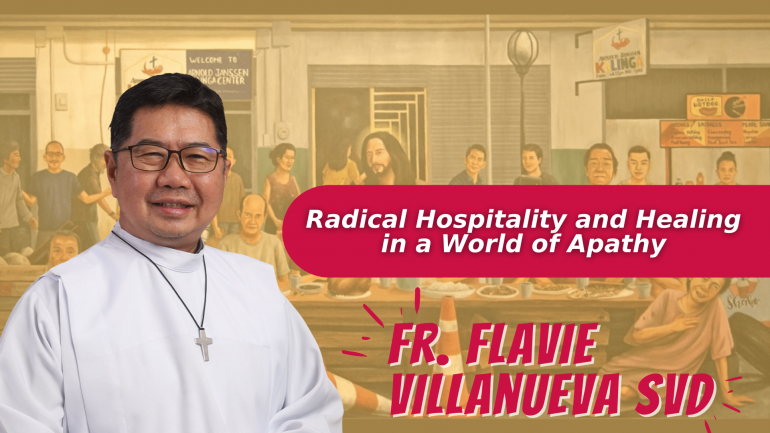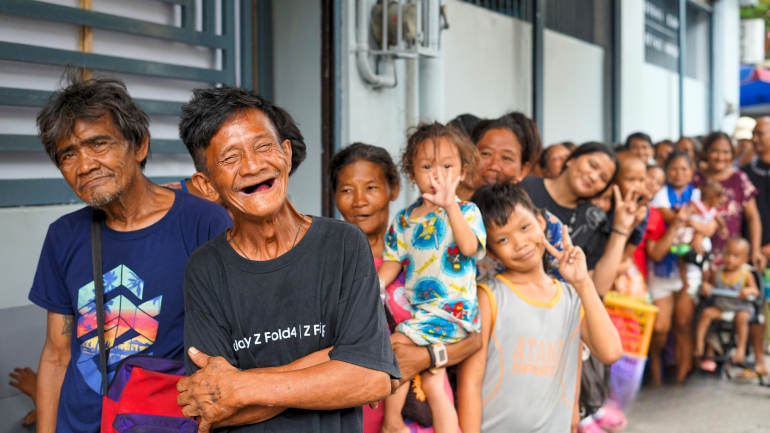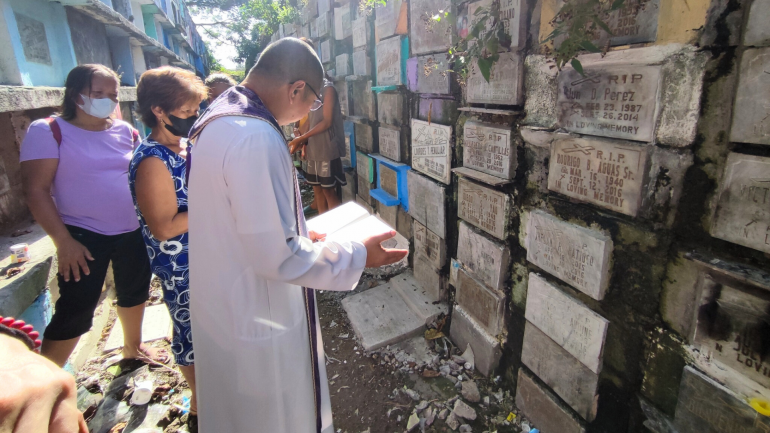Fr. Flavie Villanueva: Radical Hospitality and Healing in a World of Apathy

Since 1958, the Ramon Magsaysay Award, Asia’s premier prize and highest honor, has been bestowed on 328 individuals and 28 organizations whose lives embody “greatness of spirit.” Over nearly seven decades, only thirteen Catholic priests have joined its distinguished roster of awardees.
In 2025, Fr. Flaviano “Flavie” Villanueva, SVD, became the fourteenth priest to receive this honor. The citation for his award speaks volumes: “For his lifelong mission to uphold the dignity of the poor and the oppressed, daily proving with unwavering faith that by serving the least of their brethren, all are restored.”
At the online press conference, Fr. Flavie’s first words captured the spirit of his mission. “I receive this on behalf of the thousands of homeless and those victims of social injustice, particularly the EJK victims, that they may have a face in this fast-changing world.”
The Pandemic of Apathy
When asked what drives his advocacy, Fr. Flavie spoke of a problem deeper than poverty or corruption: apathy.
“I would point to the apathy, to the indifference, to the lack of basic care of people for their neighbor, especially for the poor, as a serious problem why we are continuously in a cycle of poverty,” he said. “People just stop caring. People just say that this is not my problem. This is the government’s problem.”
For him, homelessness is not just about lacking shelter but about being excluded from belonging. “Homelessness is not only physical, it is also about the lack of belongingness, the lack of showing that I care. That greatly creates the issue of homelessness.”

Radical Hospitality: The Kalinga Center
In 2015, Fr. Flavie founded the Arnold Janssen Kalinga Center, which embodies what he calls radical hospitality. For the homeless, Kalinga offers showers and buffet-style meals, services usually reserved for the middle class.
“When I started the center, I was clear: caring has to go beyond the usual notions. That’s why I call it dignified care,” he explained. Fresh vegetables, meat, unlimited rice, hot showers, these are not luxuries, he insists, but a reflection of human dignity. “What I have is what I wish my brother and sister would also have.”
The results are transformative. Guests face two mirrors: one before and one after a bath. “No one smiles at the first mirror,” he said. “But after showering and grooming, they stand before the second mirror, and that’s when you see the smiles. That is impact.”
Big Boy’s Story
One story stays with him from the day the center opened. It was around 3 pm. Fr. Flavie just sat to eat his lunch when he noticed a boy lingering in the corner, just watching. “I put down my spoon and fork and asked what he needed. He said nothing. But when I asked if he wanted to take a bath, he smiled,” Fr. Flavie recalled.
No volunteer would help, so he personally guided the boy, whom he calls Big Boy, to the shower. He gave him soap and a towel. But the boy refused to clean his toenails. “For some reason, I felt someone pulling me down, and I was the one who scrubbed his feet,” he said, emotion filling his voice.
“When Big Boy came out, the first thing he did was run to the mirror with a full smile. That day, I knew this mission was worth fighting for.”

Healing the Wounds: Paghilom
If Kalinga addresses homelessness, his second major advocacy, Paghilom, serves widows and orphans of extrajudicial killing (EJK) victims.
His motivation is deeply personal. “As a drug-dependent myself, I believe that drug addicts are people in need of mental health care, and most importantly, they need hope. They should never be killed. I told myself: the homeless are at the bottom of society’s priorities, and then the EJK victims, who have been pushed to the wall and unrecognized. I would like to embrace them.”
Paghilom provides psycho-spiritual interventions every Saturday. Survivors start fearful, but healing slowly nurtures courage. “Halfway through, they begin saying: ‘Father, I’m ready to speak. I would like to narrate what I saw.’ That is empowerment, and empowerment is justice.”
Justice, for him, is not only legal, it is daily survival. “Justice is about getting up every day. Justice is about an orphan deciding to finish their education. Justice also means seeking accountability and breaking the cycle of impunity.”
Responding to Critics
His outspoken advocacy has earned critics and trolls. But instead of lashing back, he sometimes engages. “I choose those with logical arguments, thinking that if logic still works, maybe faith and kindness will too. I respond with politeness. They, too, are human beings searching for belonging.”
What the Award Means
Asked what the Ramon Magsaysay Award means to him, Fr. Flavie downplayed personal glory. “The award is not about me. It speaks of the mission.”
That mission, he insists, is rooted in the Gospel itself: “When I was hungry, you gave me food. When I was thirsty, you gave me a drink. When I was sick, you cared for me.”
Greatness of spirit, he adds, is not reserved for awardees. “It is the greatness to be kind, the greatness to do something simple yet beautiful. If we recognize that, we have already won an award. And that award is called a better world, a gift we pass to the next generation.”
A Mission Worth Fighting For
From the anonymous kindness that paid for his books, to Big Boy’s first bath and the widows who find courage to speak, Fr. Flavie Villanueva has shown that transformation is not measured only in grand statistics but in daily acts of care.
The Ramon Magsaysay Award recognizes that in a fractured world numbed by indifference, his mission of radical hospitality and healing restores human dignity.
As he puts it in his simplest words: “Love has a face. It is a verb. And that word is to care.”








